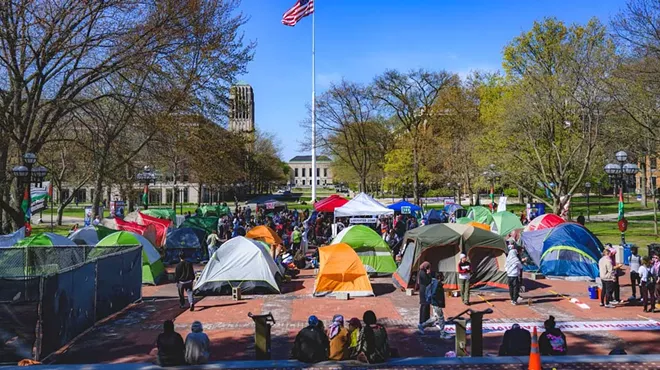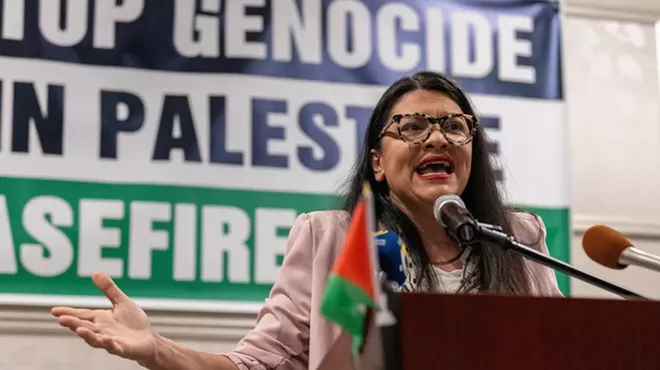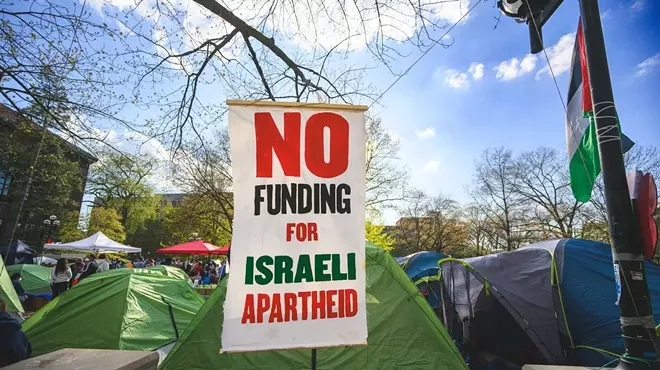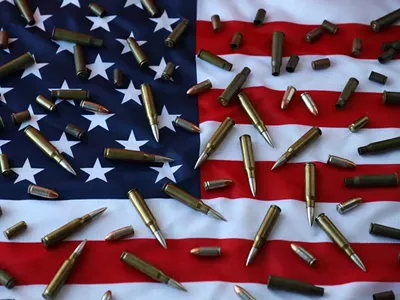ACLU criticizes Nessel for ‘excessive’ response to student protests at U-M
“The right to protest peacefully is a cornerstone of our nation’s democracy,” the civil rights organization said in a lengthy statement
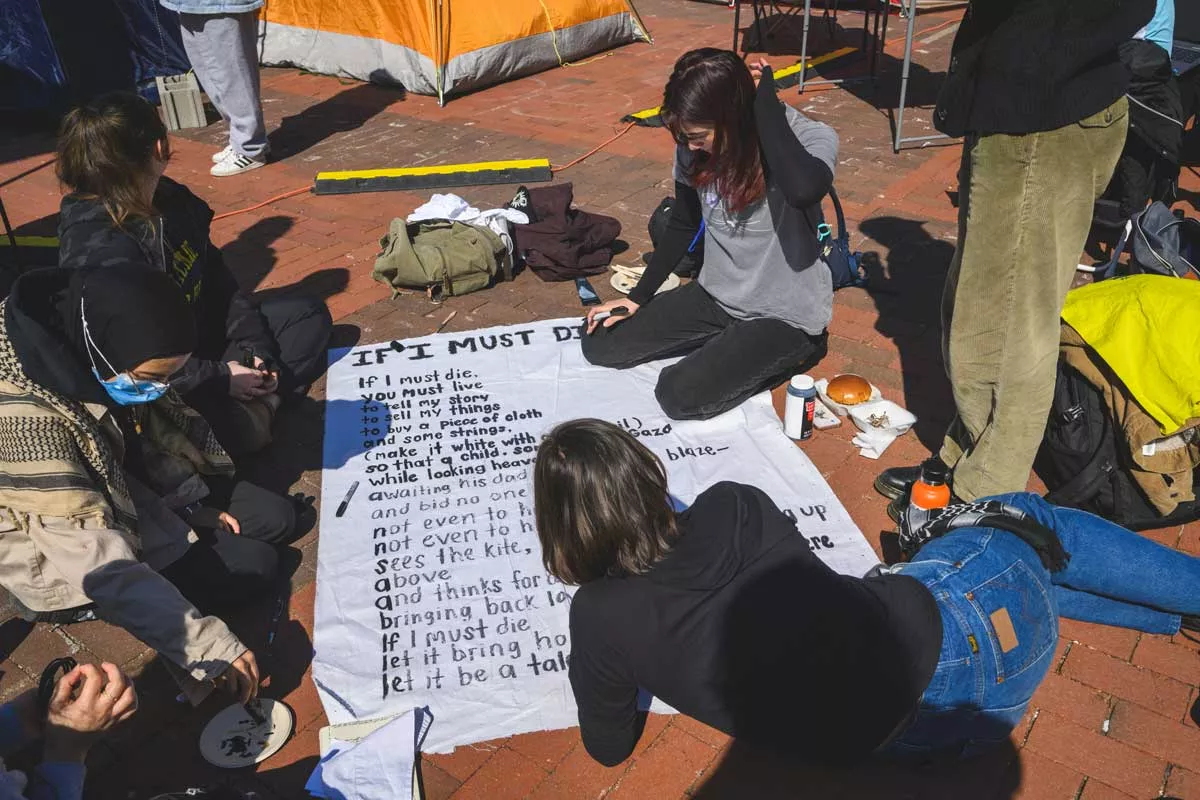

Audio By Carbonatix
[
{
"name": "GPT - Leaderboard - Inline - Content",
"component": "35519556",
"insertPoint": "5th",
"startingPoint": "3",
"requiredCountToDisplay": "3",
"maxInsertions": 100,
"adList": [
{
"adPreset": "LeaderboardInline"
}
]
}
]
The American Civil Liberties Union (ACLU) of Michigan denounced Attorney General Dana Nessel for filing criminal charges last week against nine people involved in peaceful, pro-Palestinian protests at the University of Michigan, saying it was an “unnecessary escalation” that risks “chilling future speech.”
“The right to protest peacefully is a cornerstone of our nation’s democracy,” the ACLU said in a lengthy statement. “Many of the charges by the MIOAG broadcast an alarming signal to students who engage in protest on campuses, as well as those who participate in acts of civil disobedience, which are not uncommon in a protest environment.”
On Thursday, Nessel announced she was charging protesters involved in a weeks-long encampment on the University of Michigan's Diag, which authorities dismantled on May 21. Most of those charged are alumni and students who refused to vacate the encampment after police ordered them to leave.
Two people were charged with trespassing, a misdemeanor punishable by up to 30 days in jail, for refusing to leave the encampment after repeated orders to vacate. An additional seven were charged with trespassing and resisting or obstructing a police officer, a felony punishable by up to two years in prison. These charges are reserved for those who allegedly made physical contact with officers or obstructed arrests, Nessel said.
In addition, two people, including a U-M alumnus, have been charged for separate incidents during a counter-protest on April 25. One is charged with disturbing the peace and attempted ethnic intimidation, while the other faces charges of malicious destruction of personal property for allegedly breaking and discarding protestors’ flags.
The ACLU emphasized the importance of protecting the right to peacefully protest, which it described as a “cornerstone of our nation’s democracy.” The ACLU argued that while civil disobedience may lead to legal consequences, Nessel’s actions were an “unnecessary escalation,” taking the matter beyond the university’s jurisdiction and into the state’s legal system.
Saying the charges are divisive and punitive, the ACLU underscored the broader implications of criminalizing protest activities.
“Criminal charges are not instruments of unity or learning. They are intended to punish,” the ACLU said. “They are rarely the start of a dialogue or a coming together. And they run the serious risk of chilling future speech and protest.”
The ACLU’s statement follows criticism from U.S. Rep. Rashida Tlaib, who said in an interview with Metro Times that Nessel, who is Jewish, set a dangerous precedent and didn’t take similar actions during other protests.
“We’ve had the right to dissent, the right to protest,” Tlaib said Friday. “We’ve done it for climate, the immigrant rights movement, for Black lives, and even around issues of injustice among water shutoffs. But it seems that the attorney general decided if the issue was Palestine, she was going to treat it differently, and that alone speaks volumes about possible biases within the agency she runs.”
The protest encampment, established in April, expanded to include about 60 tents, and aimed to highlight the ongoing violence against Palestinians in Gaza and the West Bank. The conflict escalated after the Oct. 7 attacks by Hamas in Gaza that killed more 1,000 people in Israel and took more than 250 hostages. In response, Israel’s U.S.-supported retaliation has resulted in the deaths of more than 40,000 people, including many women and children.
The students were advocating for a ceasefire and urging the university to divest from companies connected to Israel. Despite multiple discussions between student representatives and university officials, the encampment remained until police intervened on May 21.
Officers dressed in riot gear used batons and pepper spray to drive protesters back from the encampment before tossing tents, supplies, and students’ belongings into trash containers.
The ACLU said the police response was “excessive” and “grossly disproportionate” to what had been a peaceful protest. The group urged Nessel to reconsider her approach and called on her office to serve as “an instrument of unity” rather than contributing to “further division.”
The statement stressed the need for leaders to promote civil discourse and build bridges, especially during times of heightened tension.
The ACLU’s criticism adds to the ongoing debate over the handling of protest activities on Michigan’s university campuses and the challenges of balancing public safety with the protection of free speech and civil rights.

